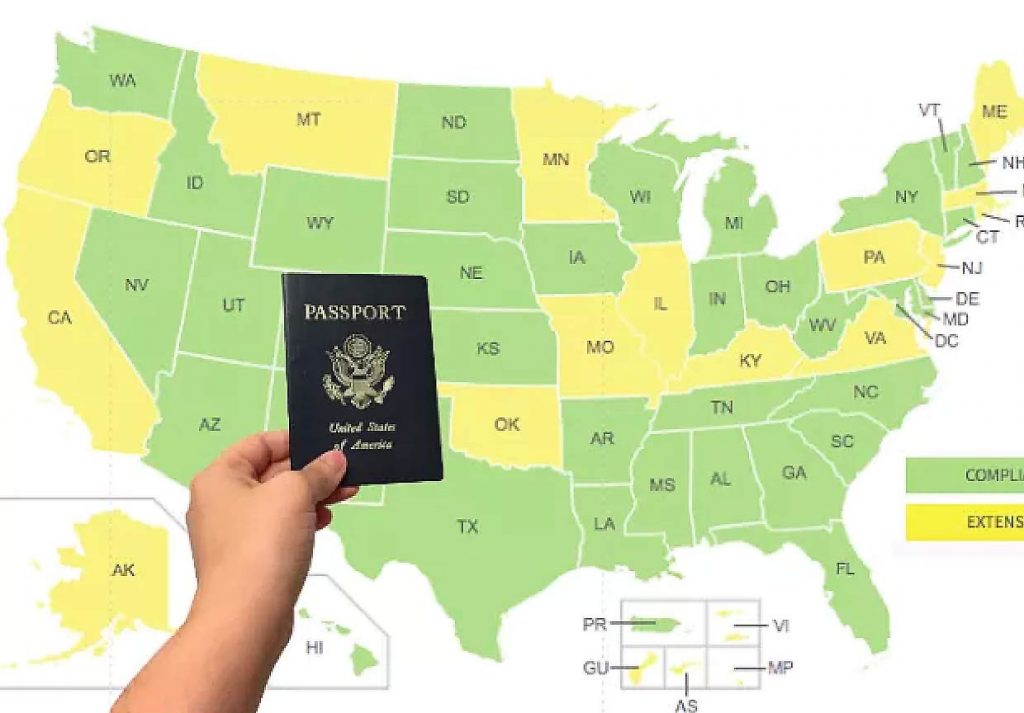
Your State and the REAL ID Act
You’ve waited in the long security check line at the airport for your domestic flight from Illinois to California. You’ve had it with all the stress and craziness of the airport and only want to find your gate. However when you give the TSA worker your boarding pass and your license she tells you it is not accepted by the U.S. Government standards. So unless you have a passport, you cannot board your plane.
This is the upcoming reality for millions of Americans across the country. Your State ID may not meet the requirements for domestic air travel under the REAL ID Act starting next year in January 2018.
So you reside in one of the many states or territories that find themselves on the “Extended State/ Territory” list for the REAL ID Act, but what does this mean for you as a traveler? Regardless if your government refuses to accept these conditions or finds themselves working very slowly to make the changes you have to pay the consequences. It is best to be informed about the standing of your state prior to boarding commercial flights from state to state, let alone before even planning your trip.
Is my state REAL ID Compliant?
Visit the government website for the most up-to-date information on the state compliance for the REAL ID Act. If your state ID or drivers license is issued from one of these states or territories listed below, then you are okay flying with your drivers license or state ID and do not need to consider applying for a passport just for domestic travel.
The following states/territories are compliant with the REAL ID Act:
- Alabama
- Arizona
- Arkansas
- Colorado
- Connecticut
- Delaware
- DC
- Florida
- Georgia
- Hawaii
- Indiana
- Iowa
- Kansas
- Maryland
- Mississippi
- Nebraska
- Nevada
- New Mexico
- Ohio
- S. Dakota
- Tennessee
- Utah
- Vermont
- West Virginia
- Wisconsin
- Wyoming
Beginning October 11, 2017 if your state does not accept the terms of the REAL ID Act then you will need a second form of identification for taking domestic commercial flights (even if it is just one state away).
**The act absolutely leaves Washington, Illinois, Minnesota, Missouri and American Samoa out of compliance and does not grant any more extensions. Thus meaning that the people of these areas must provide a second form of identification.
What States are NOT REAL ID Act Complaint?
The following states/territories have an extension through October 10, 2017, allowing Federal agencies to accept driver’s licenses and identification cards from these states/territories:
- Am.Samoa
- Idaho
- Illinois
- Louisiana
- Massachusetts
- Michigan
- N. Marianas
- New Hampshire
- New Jersey
- New York
- N. Carolina
- N. Dakota
- Puerto Rico
- Rhode Island
- Texas
- Virgin Islands
The following states/territories have a limited extension through June 6, 2017, allowing Federal agencies to accept driver’s licenses and identification cards from these states/territories:
- Alaska
- California
- Oklahoma
- Oregon
- Virginia
The following states remain noncompliant and have not been granted a renewed extension and will be subject to REAL ID enforcement following a short grace period. Starting January 30, 2017, Federal agencies and nuclear power plants may not accept for official purposes driver’s licenses and state IDs from a noncompliant state/territory without an extension.
- Kentucky
- Maine
- Montana
- Pennsylvania
- S. Carolina
The following states did not receive an extension for 2016 or 2017. Therefore, they continue to be subject to current enforcement activities. Federal agencies may not accept driver’s licenses and identification cards from these states:
- Minnesota+
- Missouri
- Washington+
+ Federal officials may continue to accept Enhanced Driver’s Licenses from these states.
So what is the REAL ID Act?
In short, after the tragedies of 9/11 Congress passed the REAL ID Act with the end goal of making identifications safer and secured, especially for travel. Less than half of the 50 states have abided by this within their government, but the other half have not. Following the “grace period” ending in October 2017, if states have not made the necessary changes they need to obtain and travel with a second form of identification.
